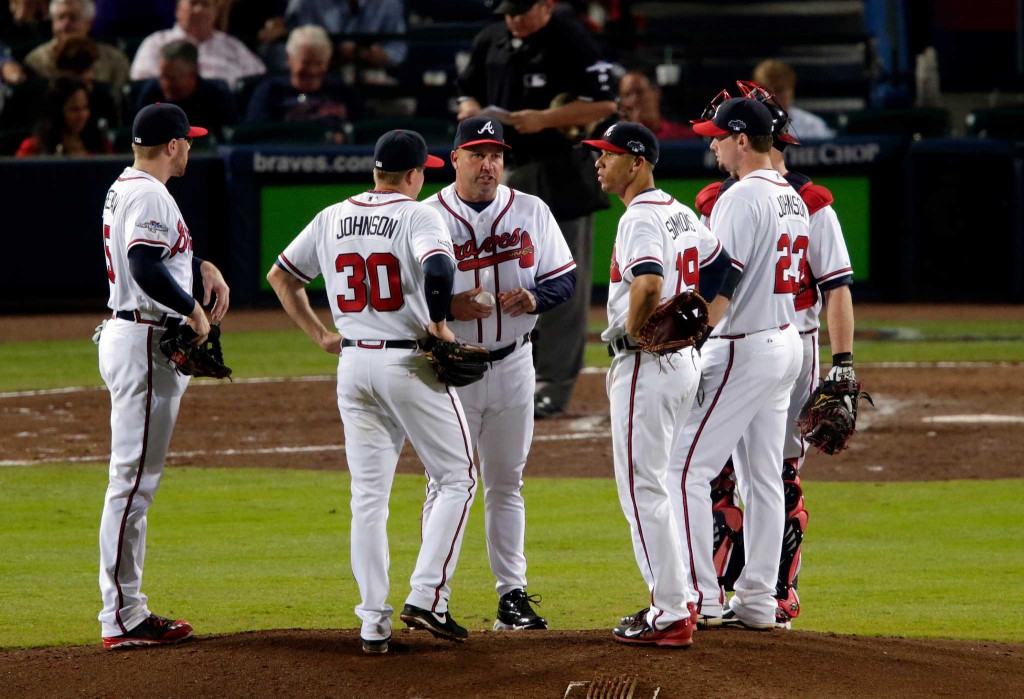By Glenn Miller
So much went right for the Atlanta Braves in 2013. They won the National League East in a walk, by 10 games over the much-hyped Washington Nationals. They won 96 games, the team’s highest number since 2004 when they also won 96. The Braves haven’t won more games since winning 101 in 2003.
It was a grand season. They romped through April, bolting out of the gate to a 12-1 record in mid-April and then reeled off a 14-game winning streak in late July and through the first nine days of August. They seemed primed for a special October, a march deep into the post-season. It didn’t happen. The Los Angeles Dodgers sent them home by winning the best-of-five National League Division Series 3 games to 1.
So, why did this happen? One doesn’t need to know as much about baseball as manager Fredie Gonzalez or general manager Frank Wren to grasp the why behind the quick October playoff exit.
The Dodgers hit .333 with seven homers in those four games. The Braves hit .214 with one homer in those games. The Dodgers had a 3.09 team earned run average. The Braves had a 5.82 team earned run average, nearly two runs higher than the Los Angeles playoff ERA.
The Braves were outscored 46-14 by the Dodgers in the series. That’s a surefire recipe for losing. And that’s what they did, from Game 1 of the series when Atlanta ran into a buzz saw by the name of Clayton Kershaw, the Dodger lefty who may be the best starting pitcher in Major League Baseball.
The Dodgers won 6-1 in Turner Field behind seven strong innings from Kershaw, who struck out 12 and allowed only three hits. All five of the Braves’ hits were singles and they were 1-for-8 with runners in scoring position.
They bounced back at home in Game 2 with a 4-3 victory behind solid pitching from Mike Minor, who struck out five in 6 1/3 innings. Then, they flew across the country to Los Angeles, to Dodger Stadium and to the end of the 2013 road.
The Dodgers thumped the Braves 13-6 in Game 3. Braves starter Julio Teheran was rocked for six earned run on eight hits in 2 2/3 innings. He was replaced by reliever Alex Wood, who didn’t provide much relief. The Dodgers got four runs off Wood in 2 1/3 innings. After four innings of Game 3, the Dodgers trailed 10-4.
Game 4 wasn’t a blowout but in the end all that mattered is that the season ended. The Dodgers won 4-3. Third baseman Chris Johnson was 3-for-4 but the rest of the Atlanta lineup was a combined 4-for-32.
That was it. A good season ended with an early playoff exit.
Johnson, who was given the unenviable task of replacing Atlanta legend and future Hall of Famer Chipper Jones, nearly won the National League batting title. He wound up second with a .321 mark.
Reliever Craig Kimbrel led the league with 50 saves and first baseman Freddie Freeman’s 109 RBI ranked second in the league. This was a team with a bit of everything.
Shortstop Andrelton Simmons was very good defensively and added 17 homers for the lineup. Catcher Brian McCann belted 20 homers in only 102 games. Justin Upton hit 27 homers.
Four pitchers won 10 or more games – Kris Medlen (15), Teheran (14), Mike Minor (13) and Paul Maholm (10).
The Braves’ regular-season success can, in part, be linked to two key statistics. They led the league with 181 home runs and their pitchers led the league with a 3.18 ERA.
Why did they not get past the Dodgers? Well, they hit one homer in four games and their Division Series ERA of 5.82 was nearly two and two-thirds runs higher than the regular season mark.
Yep, a recipe for trouble.
Yet, the Braves reached October despite some bumps along the way. On Aug. 21, outfielder Jason Heyward suffered a broken jaw when hit in the face with a pitch. In July starting pitcher Tim Hudson was stepped on in a close play at first, enduring a gruesome season-ending broken ankle.
In all, according to a Sports Illustrated account, 18 Braves “spent at least 15 days on the disabled list.”
That led to T-shirts, the magazine’s Ben Reiter wrote, that had these words on them: “SUFFER IN SILENCE.”
Maybe, despite all they achieved and overcame, the Braves were destined for a short October, if one believes in jinxes or hexes. The Braves brother duo of outfielders B. J. Upton and Justin Upton were featured on the cover of the Oct. 7 cover of Sports Illustrated along with supermodel Kate Upton.
For decades, there has been talk about the jinx for any athlete or team that appears on the magazine’s cover.
Maybe that had something to do with the October loss. That and the Dodgers pitching and hitting and the lack of same from the Braves.

